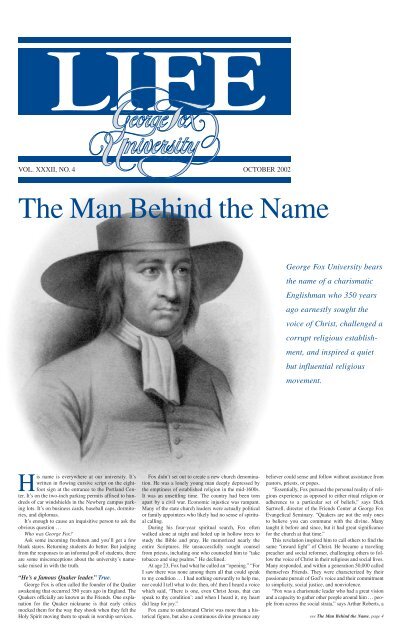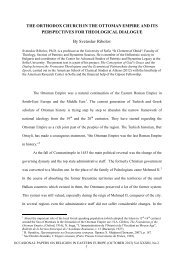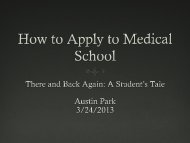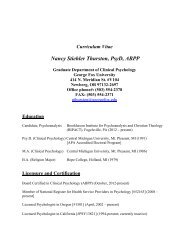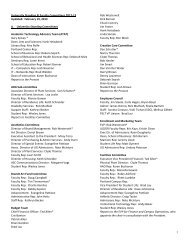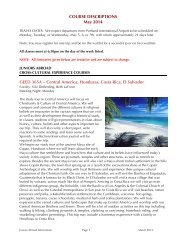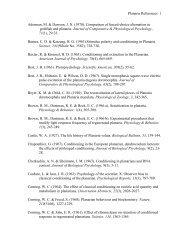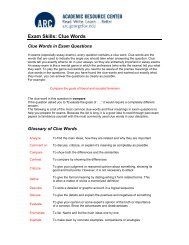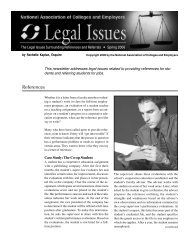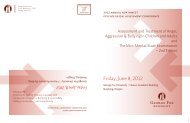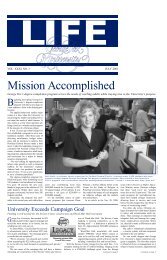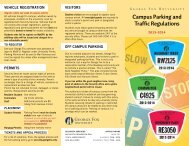LIFE Vol 32, No 4 - George Fox University
LIFE Vol 32, No 4 - George Fox University
LIFE Vol 32, No 4 - George Fox University
Create successful ePaper yourself
Turn your PDF publications into a flip-book with our unique Google optimized e-Paper software.
<strong>Vol</strong> <strong>32</strong> <strong>No</strong> 4 9/24/02 9:23 AM Page 1<br />
<strong>LIFE</strong><br />
VOL. XXXII, NO. 4 OCTOBER 2002<br />
The Man Behind the Name<br />
<strong>George</strong> <strong>Fox</strong> <strong>University</strong> bears<br />
the name of a charismatic<br />
Englishman who 350 years<br />
ago earnestly sought the<br />
voice of Christ, challenged a<br />
corrupt religious establishment,<br />
and inspired a quiet<br />
but influential religious<br />
movement.<br />
His name is everywhere at our university. It’s<br />
written in flowing cursive script on the eightfoot<br />
sign at the entrance to the Portland Center.<br />
It’s on the two-inch parking permits affixed to hundreds<br />
of car windshields in the Newberg campus parking<br />
lots. It’s on business cards, baseball caps, dormitories,<br />
and diplomas.<br />
It’s enough to cause an inquisitive person to ask the<br />
obvious question …<br />
Who was <strong>George</strong> <strong>Fox</strong>?<br />
Ask some incoming freshmen and you’ll get a few<br />
blank stares. Returning students do better. But judging<br />
from the responses to an informal poll of students, there<br />
are some misconceptions about the university’s namesake<br />
mixed in with the truth.<br />
“He’s a famous Quaker leader.” True.<br />
<strong>George</strong> <strong>Fox</strong> is often called the founder of the Quaker<br />
awakening that occurred 350 years ago in England. The<br />
Quakers officially are known as the Friends. One explanation<br />
for the Quaker nickname is that early critics<br />
mocked them for the way they shook when they felt the<br />
Holy Spirit moving them to speak in worship services.<br />
<strong>Fox</strong> didn’t set out to create a new church denomination.<br />
He was a lonely young man deeply depressed by<br />
the emptiness of established religion in the mid-1600s.<br />
It was an unsettling time. The country had been torn<br />
apart by a civil war. Economic injustice was rampant.<br />
Many of the state church leaders were actually political<br />
or family appointees who likely had no sense of spiritual<br />
calling.<br />
During his four-year spiritual search, <strong>Fox</strong> often<br />
walked alone at night and holed up in hollow trees to<br />
study the Bible and pray. He memorized nearly the<br />
entire Scriptures. He unsuccessfully sought counsel<br />
from priests, including one who counseled him to “take<br />
tobacco and sing psalms.” He declined.<br />
At age 23, <strong>Fox</strong> had what he called an “opening.” “For<br />
I saw there was none among them all that could speak<br />
to my condition … I had nothing outwardly to help me,<br />
nor could I tell what to do; then, oh! then I heard a voice<br />
which said, ‘There is one, even Christ Jesus, that can<br />
speak to thy condition’: and when I heard it, my heart<br />
did leap for joy.”<br />
<strong>Fox</strong> came to understand Christ was more than a historical<br />
figure, but also a continuous divine presence any<br />
believer could sense and follow without assistance from<br />
pastors, priests, or popes.<br />
“Essentially, <strong>Fox</strong> pursued the personal reality of religious<br />
experience as opposed to either ritual religion or<br />
adherence to a particular set of beliefs,” says Dick<br />
Sartwell, director of the Friends Center at <strong>George</strong> <strong>Fox</strong><br />
Evangelical Seminary. “Quakers are not the only ones<br />
to believe you can commune with the divine. Many<br />
taught it before and since, but it had great significance<br />
for the church at that time.”<br />
This revelation inspired him to call others to find the<br />
same “inward light” of Christ. He became a traveling<br />
preacher and social reformer, challenging others to follow<br />
the voice of Christ in their religious and social lives.<br />
Many responded, and within a generation 50,000 called<br />
themselves Friends. They were characterized by their<br />
passionate pursuit of God’s voice and their commitment<br />
to simplicity, social justice, and nonviolence.<br />
“<strong>Fox</strong> was a charismatic leader who had a great vision<br />
and a capacity to gather other people around him … people<br />
from across the social strata,” says Arthur Roberts, a<br />
see The Man Behind the Name, page 4
<strong>Vol</strong> <strong>32</strong> <strong>No</strong> 4 9/24/02 9:23 AM Page 2<br />
2<br />
New Facility<br />
Opening in<br />
Salem<br />
Seeking to meet the needs of its graduate<br />
and professional studies students in the<br />
mid-Willamette Valley, <strong>George</strong> <strong>Fox</strong> this<br />
<strong>No</strong>vember will open a center in south Salem.<br />
The newly leased building — to be called<br />
the Salem Center — has been remodeled to<br />
include three classrooms with a total capacity<br />
of 100, as well as computer facilities, four<br />
counseling rooms with observation areas, a<br />
student lounge, and four offices. Three professors<br />
and a site director are expected to<br />
have offices at the center.<br />
<strong>George</strong> <strong>Fox</strong> currently offers classes in<br />
Salem for about 75 students using classrooms<br />
at two Salem churches.<br />
“This is good news for students who want<br />
a <strong>George</strong> <strong>Fox</strong> education and who live in<br />
Salem, Albany, Corvallis, and elsewhere in<br />
the region,” says <strong>George</strong> <strong>Fox</strong> Provost Robin<br />
Baker. “We’ll be able to provide better service<br />
to the students we currently have, and we<br />
hope to offer other programs in the future.”<br />
<strong>George</strong> <strong>Fox</strong> currently offers four degrees in<br />
Salem: a master of arts in teaching, a master<br />
of arts in counseling, a bachelor’s in management<br />
and organizational leadership, and a<br />
bachelor’s in social and behavioral studies.<br />
<strong>LIFE</strong> STAFF<br />
Editor<br />
Anita Cirulis<br />
Contributing Writers<br />
Anita Cirulis<br />
Rob Felton<br />
Barry Hubbell<br />
Photographers<br />
Gary Allen<br />
Adam Bettcher<br />
Anita Cirulis<br />
Jerome Hart<br />
Designer<br />
Colin Miller<br />
<strong>George</strong> <strong>Fox</strong> <strong>University</strong> <strong>LIFE</strong> (USPS 859-<br />
820) is published four times a year by<br />
<strong>George</strong> <strong>Fox</strong> <strong>University</strong>, 414 N. Meridian<br />
Street, Newberg, OR, 971<strong>32</strong>-2697, USA.<br />
Periodicals postage paid at Newberg,<br />
Oregon. Postmaster: Send address<br />
changes to <strong>LIFE</strong>, <strong>George</strong> <strong>Fox</strong> <strong>University</strong>,<br />
414 N. Meridian St. #6069, Newberg, OR<br />
971<strong>32</strong>-2697.<br />
Please send letters, alumni news, and<br />
address changes to <strong>LIFE</strong>, <strong>George</strong> <strong>Fox</strong><br />
<strong>University</strong>, 414 N. Meridian St. #6069,<br />
Newberg, OR 971<strong>32</strong>-2697.<br />
Phone: 503-554-2126. Use our<br />
Web site: www.georgefox.edu/alumni,<br />
and click “Send Us Your News.”<br />
E-mail: alumni@georgefox.edu.<br />
GEORGE FOX UNIVERSITY<br />
ADMINISTRATION<br />
President<br />
H. David Brandt<br />
Provost<br />
Robin E. Baker<br />
Vice President for Marketing and<br />
Advancement<br />
Dana L. Miller<br />
Vice President for Financial Affairs<br />
G. Michael Goins<br />
Vice President for Student Life<br />
Bradley A. Lau<br />
Executive Assistant to the President<br />
Barry A. Hubbell<br />
<strong>George</strong> <strong>Fox</strong> Again in Top Tier of Rankings<br />
<strong>George</strong> <strong>Fox</strong> <strong>University</strong><br />
continues to be ranked<br />
as a first-tier university<br />
by U.S.News & World Report in<br />
its 2003 edition of “America’s<br />
Best Colleges.”<br />
In the rankings, released to<br />
the public Sept. 13, <strong>George</strong> <strong>Fox</strong><br />
ranks 19th in the west region in<br />
the “Universities-Master’s” category.<br />
Thirty-three universities are<br />
listed in the top tier. There are 572<br />
universities (126 in the West) classified as<br />
Universities-Master’s. These institutions<br />
provide a full range of undergraduate and<br />
master’s level programs, but few, if any,<br />
doctoral programs.<br />
This is the second year <strong>George</strong> <strong>Fox</strong><br />
Tapia and Hoover Named Employees of the Year<br />
Shelley Tapia serves as an administrative<br />
secretary in the student life<br />
office, working with housing and residence<br />
life and supervising the office’s<br />
student workers. Ginger Hoover oversees<br />
a staff of 12 and more than 100 student<br />
employees responsible for keeping<br />
campus facilities clean. Despite their<br />
dissimilar roles, they share much in Ginger Hoover<br />
common, including recognition as<br />
<strong>George</strong> <strong>Fox</strong> <strong>University</strong>’s employees of the year for 2002.<br />
Hoover, a 20-year employee — 18 years as superintendent<br />
of custodial services — was named administrative staff<br />
employee of the year. Tapia, who has worked for her alma<br />
mater since graduating from <strong>George</strong> <strong>Fox</strong> in 1991, received<br />
support staff employee of the year honors.<br />
Co-workers praise both for their servant hearts. “Never<br />
manifesting a superior attitude” is the way Hoover was<br />
described by one of her nominators. “Never treats anyone as<br />
inferior” are the similar words used of Tapia.<br />
What’s in a Name?<br />
Names have been important throughout history. In the<br />
beginning chapters of Genesis, we read that the<br />
names Adam and Eve had meanings. Adam means “seed,”<br />
or “man,” and Eve means “living,” because she would<br />
become the mother of all the living.<br />
The biblical record, especially in the Old Testament,<br />
regularly gives the meaning of people’s names. Our contemporary<br />
national culture doesn’t put the same value on<br />
meanings of names, but we continue to name children carefully<br />
— grandmother’s name is used as the middle name of<br />
a newborn girl, or a new son becomes “junior.”<br />
<strong>University</strong> commencements largely are about names. It<br />
is most important that each graduate’s name is pronounced<br />
correctly. Names matter.<br />
Names often are triggers, conjuring up images that are<br />
less-than-accurate representations of the real thing. In<br />
today’s world, words such as United States and Islam commonly<br />
carry emotional baggage in addition to the identification<br />
content they bring. Words like Ivy League (an athletic<br />
conference) carry prestige in the academic world.<br />
Some churches are changing their names because<br />
denominational references are thought to carry negative<br />
connotations. My wife, Melva, and I grew up in different<br />
Mennonite churches. Both now carry names that do not<br />
include the word Mennonite.<br />
Almost 40 years ago, we worshipped in a Mennonite<br />
church on the south side of Chicago in a neighborhood that<br />
had no idea what Mennonite meant, except for what it saw<br />
in this particular, small church. The church defined the<br />
Mennonite name for that neighborhood, rather than the<br />
name defining the church.<br />
So, what do people think when they hear <strong>George</strong> <strong>Fox</strong><br />
<strong>University</strong>? What does it mean, and what are the images it<br />
brings to people’s minds?<br />
<strong>George</strong> <strong>Fox</strong> <strong>University</strong> is identified with the founder of<br />
has been in the Universities-Master’s<br />
category.<br />
Last year, <strong>George</strong><br />
<strong>Fox</strong> ranked 17th.<br />
Before making the<br />
switch to the new category,<br />
<strong>George</strong> <strong>Fox</strong> in<br />
2000 ranked first in<br />
academic reputation<br />
among Western<br />
regional liberal arts<br />
colleges (now called “Comprehensive<br />
Colleges-Bachelor’s”).<br />
“These rankings don’t reflect all the<br />
intangibles involved in a college experience,<br />
but they are an influential resource<br />
for many prospective students,” says<br />
<strong>George</strong> <strong>Fox</strong> President David Brandt. “We<br />
Hoover and Tapia were singled out<br />
for their love of students and for sharing<br />
their lives with them. Both have led student<br />
serve trips a number of times.<br />
Hoover helps mentor international students<br />
and Tapia is “always … cheerful<br />
and ready to help students no matter<br />
what the question or problem.”<br />
Shelley Tapia Hoover was cited for “long, loyal service,”<br />
for working “beyond the call of<br />
duty,” for her involvement with and care for her co-workers<br />
and for helping initiate the Staff Development Committee.<br />
Tapia, who also holds a master’s degree in counseling psychology<br />
from <strong>George</strong> <strong>Fox</strong> Evangelical Seminary, was commended<br />
for her attention to detail and the thoroughness of her<br />
work; for being faithful, humble, genuine, and “a great example<br />
of Christian love, patience, kindness and a peaceful spirit”;<br />
and for her “many selfless years.”<br />
The employee recognition program was started nine years<br />
ago. Recipients receive a plaque and a $250 cash award.<br />
the Friends (Quaker) movement, which began 350 years<br />
ago in England. Does <strong>George</strong> <strong>Fox</strong>, the man, define our<br />
contemporary, 21st-century <strong>George</strong> <strong>Fox</strong> <strong>University</strong>, or<br />
does the university define him?<br />
My hope and prayer is that the<br />
answer to that question is “both.”<br />
But there are difficulties associated<br />
with this answer. We know the<br />
<strong>George</strong> <strong>Fox</strong> of the 17th century<br />
only indirectly — as interpreted<br />
by many different historians and<br />
storytellers.<br />
Whose interpretation is right?<br />
President<br />
David Brandt<br />
work hard to make <strong>George</strong> <strong>Fox</strong> a place<br />
where academic scholarship and Christcentered<br />
spirituality are nurtured. It’s<br />
gratifying to have U.S.News recognize the<br />
academic quality of our university.”<br />
The rankings consider six factors: peer<br />
assessment (25 percent), graduation and<br />
retention rates (25 percent), faculty<br />
resources (20 percent), student selectivity<br />
(15 percent), financial resources (10 percent),<br />
and alumni giving (5 percent).<br />
The rankings, including the component<br />
information on each school’s score,<br />
is available online at www.usnews.com.<br />
This is the 14th year <strong>George</strong> <strong>Fox</strong> <strong>University</strong><br />
has been ranked as one of “America’s<br />
Best Colleges” by U.S.News &<br />
World Report.<br />
<strong>George</strong> <strong>Fox</strong> called his generation<br />
to repentance and faith in<br />
Jesus Christ. He had intimate<br />
experiences with God and taught that each person could<br />
know God and could hear God’s voice — that Jesus is present<br />
and “knowable.”<br />
<strong>George</strong> <strong>Fox</strong> <strong>University</strong> must honor <strong>George</strong> <strong>Fox</strong> while it<br />
deliberately and gladly honors Jesus Christ. We will focus<br />
on the message of salvation and life through Christ, fulfilling<br />
our mission “to demonstrate the meaning of Jesus<br />
Christ by offering a caring educational community in<br />
which each individual may achieve the highest intellectual<br />
and personal growth, and by participating responsibly in<br />
our world’s concerns.”<br />
So, what’s in a name? The name <strong>George</strong> <strong>Fox</strong> is ours to<br />
define to our generation. Our roots are strong and healthy.<br />
Our task is to interpret those roots clearly, without jargon, to<br />
a world that needs a Christ-centered <strong>George</strong> <strong>Fox</strong> <strong>University</strong>.
<strong>Vol</strong> <strong>32</strong> <strong>No</strong> 4 9/24/02 9:23 AM Page 3<br />
3<br />
Serve Day 2002<br />
On the day the nation paused to remember last year’s terrorist attacks,<br />
<strong>George</strong> <strong>Fox</strong> students and employees went into the community to serve<br />
Helping out in Newberg (top to bottom): cleaning wheelchairs at Chehalem Health and Rehab are (left to right)<br />
freshmen Diane Medema and Valerie Schull, sophomore Kelly Gill, freshman Rachel Yim, and sophomore Cristina<br />
Reyes; freshman Thomas Howe trims a laurel hedge behind the <strong>No</strong>rthwest Yearly Meeting of Friends offices; Adam<br />
Baron, a residence hall area coordinator, rototills the garden at the Cashman Adult Foster Home; sophomore Becky<br />
Boyd prepares to paint a shelter at the Chehalem Skate Park.<br />
The juxtaposition of Serve Day<br />
with Sept. 11 wasn’t intentional;<br />
the date for the annual event was<br />
scheduled before the attacks occurred.<br />
But it was appropriate — especially in<br />
light of President Bush’s call for Americans<br />
to respond with service.<br />
Gathered in front of Minthorn Hall on<br />
a sunny Wednesday morning, Serve Day<br />
participants heard a charge from President<br />
David Brandt, who quoted a survivor<br />
of the World Trade Center collapse:<br />
“The backward look at Sept. 11 doesn’t<br />
give us what the forward look should be.”<br />
“We must do more than remember,”<br />
Brandt said. “On a day when words are<br />
hard to find … it’s good to do something<br />
— to work on behalf of others.”<br />
Also challenging the <strong>George</strong> <strong>Fox</strong><br />
community to service was Dean Harry,<br />
who graduated from <strong>George</strong> <strong>Fox</strong> Evangelical<br />
Seminary in 1997 with a master’s<br />
degree in counseling psychology. After<br />
reading from Romans 12:1, Harry made<br />
a confession.<br />
“When I graduated, I had no non-<br />
Christian friends,” he said. “I realized<br />
how selfish I was, and I offered my body<br />
to God to use however he wanted.”<br />
Joining a fire department as a volunteer,<br />
he served as a chaplain and then<br />
became a firefighter and emergency<br />
medical technician.<br />
Harry developed a passion for trauma<br />
counseling that led him around the world<br />
and — one week after the Sept. 11 attacks<br />
— to New York City, where he provided<br />
counseling to those working among the<br />
ruins of the World Trade Center.<br />
“When I offered my body to God in<br />
1997,” he told Serve Day workers, “I never<br />
knew it would lead me to Ground Zero.”<br />
The one-year anniversary was on the<br />
minds of many of the approximately<br />
1,400 students, faculty, and staff who<br />
spent the day at 57 service project sites.<br />
“It’s the perfect thing in light of Sept.<br />
11,” said Jaimi Bogen, a senior from<br />
Sheridan, Ore. Bogen spent the day painting<br />
the historic building housing Newberg’s<br />
Chamber of Commerce. “I had<br />
wondered, ‘What can I do to help?’ and<br />
this way I feel like I’m doing something.”<br />
Mark Pothoff, the university’s dean of<br />
students, said Sept. 11 was the topic of<br />
conversation among his Serve Day team.<br />
Thirty students and nine faculty and staff<br />
members worked with Pothoff at the<br />
Newberg Public Library, where they<br />
moved books, cleaned toys, repaired<br />
computers, and did landscaping.<br />
“We talked about it at lunch,” he said.<br />
“Our Serve Day theme this year is<br />
Remember, Reflect, Respond. This is a<br />
good way to respond: to give back, to<br />
help people.”<br />
At Chehalem Care Center, a Serve<br />
Day team did yard work, cleaned wheelchairs,<br />
and visited residents. The events<br />
of Sept. 11 influenced a hymn sing with<br />
the care center residents, who requested<br />
patriotic songs, including the national<br />
anthem. In the afternoon, residents and<br />
students gathered to plant a tree dedicated<br />
to the memory of that day.<br />
Churches, schools, social-service<br />
agencies, community and nonprofit organizations<br />
— all benefited from the service<br />
donated by <strong>George</strong> <strong>Fox</strong> volunteers.<br />
But as the university’s vice president<br />
for student life, Brad Lau, said when<br />
sending those volunteers out into the<br />
community, those being served weren’t<br />
the only ones affected by the day.<br />
“As we respond to Sept. 11 through<br />
service,” he told Serve Day participants,<br />
“may we do so with a pure heart. May it<br />
be not just a day, but a way of life.<br />
So often, the one most impacted<br />
through service is the one who serves.”<br />
— Anita Cirulis<br />
“Everybody can be great, because<br />
anybody can serve. You don’t have<br />
to have a college degree to serve.<br />
You don’t have to make your subject<br />
and verb agree to serve. You<br />
don’t have to know about Plato<br />
and Aristotle to serve. You don’t<br />
have to know about Einstein’s<br />
theory of relativity to serve. You<br />
don’t have to know the second law<br />
of thermodynamics to serve. You<br />
only need a heart full of grace and<br />
a soul regenerated by love.”<br />
— Martin Luther King Jr.<br />
Serve Day Ends<br />
With Service<br />
Commemorating<br />
Sept. 11<br />
After spending Sept. 11 serving others,<br />
<strong>George</strong> <strong>Fox</strong> students, faculty, and staff<br />
came together for an evening prayer and<br />
worship service. Gathered in Bauman Auditorium<br />
and joined by members of the Newberg<br />
community, they brought Serve Day to a<br />
close and commemorated the one-year<br />
anniversary of the terrorist attacks on the<br />
United States.<br />
“Take a moment to reflect and picture<br />
those you served,” said faculty member Tom<br />
Head as he addressed the crowd of 400. “Did<br />
you catch a glimpse of someone else today?<br />
Did you catch a glimpse of someone who<br />
came to earth 2,000 years ago?”<br />
Referring to the Gospel of Matthew where<br />
Jesus says those who serve the overlooked<br />
and ignored serve him, Head reminded the<br />
audience “the one we encountered today is<br />
the Prince of Peace.”<br />
Campus Pastor Gregg Lamm prefaced a<br />
multimedia presentation with his own<br />
reminder. “Ultimately, it won’t be therapy that<br />
brings healing,” he said. “Some say time is<br />
the best healer. <strong>No</strong>t on your life. The Holy<br />
Spirit is the best healer.”<br />
Images from Sept. 11, 2001, then filled the<br />
screen, coupled with Bible verses about<br />
God’s character, sovereignty, and promises.<br />
On the stage, artwork by <strong>George</strong> <strong>Fox</strong><br />
senior Christine Riker — painted as a<br />
response to 9-11 — rested on an easel. A<br />
group of students read selections from the<br />
Bible, Time magazine, and a prayer by St.<br />
Francis of Assisi. Members of the audience<br />
joined the Worship Band in singing praise<br />
choruses and hymns and participated in a<br />
responsive reading.<br />
Meredith Dougherty of the student life<br />
office gave perhaps the best summary of<br />
<strong>George</strong> <strong>Fox</strong> <strong>University</strong>’s response to Sept. 11<br />
when she quoted Psalm 34:14: “Turn from<br />
evil and do good; seek peace and pursue it.”<br />
“Today we did good,” she said simply.<br />
“Today we connected with people.”
<strong>Vol</strong> <strong>32</strong> <strong>No</strong> 4 9/24/02 9:23 AM Page 4<br />
4<br />
Friends Center<br />
Established at<br />
Seminary<br />
<strong>George</strong> <strong>Fox</strong> Evangelical Seminary is<br />
expanding in January to include a new<br />
Friends Center for Quaker studies in the<br />
<strong>No</strong>rthwest.<br />
It will be a cooperative effort with the<br />
<strong>No</strong>rthwest Yearly Meeting of Friends Church.<br />
The center’s vision statement calls for it to<br />
create a center for leadership formation,<br />
training, education,<br />
clarification<br />
of call, and<br />
preparation for<br />
ministry of evangelical<br />
Friends in<br />
the <strong>No</strong>rthwest<br />
and beyond.<br />
The Friends<br />
Richard Sartwell,<br />
director,<br />
Friends Center<br />
Center will be<br />
housed in the<br />
university’s Portland<br />
Center. The<br />
new center may set the pattern for future<br />
denominational centers, says President David<br />
Brandt. “The seminary desires to serve the<br />
church, and this is an example of the church<br />
and seminary partnering together in preparing<br />
church leaders.”<br />
<strong>George</strong> <strong>Fox</strong> will provide the center with<br />
office space and classroom facilities, faculty,<br />
and administrative support. The church organization<br />
will fund salaries and operating<br />
expenses, provide Friends instructors, and<br />
name a board of directors.<br />
Brandt said planning for the center began<br />
nearly two years ago. A study task force was<br />
established by the <strong>No</strong>rthwest Yearly Meeting;<br />
its recommendations were adopted by the<br />
church organization this summer.<br />
The new center will offer courses both<br />
through the seminary and through the church<br />
organization. Faculty will consist of current<br />
seminary and undergraduate faculty affiliated<br />
with the Friends Church, and Friends Church<br />
pastors and leaders in the area.<br />
The center is expected to eventually have<br />
about 25 full-time-equivalent students participating.<br />
Currently, the seminary has about<br />
eight Friends students enrolled. The Friends<br />
Center likely will offer courses for continuing<br />
education for current church leaders, and<br />
perhaps certificate programs in specific<br />
areas.<br />
A function of the new center will be to<br />
provide scholarship support for Friends students<br />
by raising funds and developing a<br />
scholarship program.<br />
Named the center’s first director is Richard<br />
Sartwell, longtime pastor of the Newberg<br />
Friends Church and a member of the <strong>George</strong><br />
<strong>Fox</strong> board of trustees. Sartwell served as<br />
pastor of the Newberg church for 14 years<br />
until resigning in January.<br />
The Man Behind the Name<br />
continued from page 1<br />
Quaker scholar and the university’s<br />
professor at large.<br />
Today there are an estimated<br />
400,000 Friends in the world,<br />
including 100,000 in the United<br />
States. Within the movement,<br />
beliefs range from Christ-centered<br />
evangelical (like <strong>George</strong> <strong>Fox</strong> <strong>University</strong>)<br />
to agnostic liberal.<br />
“He founded the university.”<br />
False.<br />
This is the most common misperception<br />
among students, who<br />
don’t realize <strong>Fox</strong> died 200 years<br />
before the university was established<br />
by Newberg Quaker settlers.<br />
Friends Pacific Academy<br />
was established in 1885. Pacific<br />
College was added to the academy<br />
in 1891 and was renamed<br />
<strong>George</strong> <strong>Fox</strong> College in 1949. A former<br />
college president advocated renaming<br />
the school Herbert Hoover College, after<br />
the United States president who attended<br />
the academy. Instead, a letter to the<br />
Pacific leaders from Arthur Roberts —<br />
then a recent graduate of the school —<br />
convinced them <strong>George</strong> <strong>Fox</strong>’s historic<br />
and religious significance made him a<br />
worthy namesake for the college. <strong>George</strong><br />
<strong>Fox</strong> College became a university in 1996.<br />
“He looks like the guy on the Quaker<br />
Oats oatmeal carton.” Half true.<br />
It isn’t <strong>Fox</strong> in the picture, but the<br />
Quaker Oats Company does use a portrait<br />
of a rosy-cheeked fellow wearing<br />
the same simple style of hat and clothing<br />
that all common men of <strong>George</strong> <strong>Fox</strong>’s era<br />
wore. While many Americans confuse<br />
the Amish — who continue to wear<br />
quaint homespun styles — and Quakers,<br />
Friends today do not wear clothing from<br />
that era.<br />
While the Quaker Oats Company has<br />
no ties to the Friends movement, it is<br />
one example of several unaffiliated businesses<br />
that adopted the Quaker name<br />
and image because of the Quaker reputation<br />
for integrity. <strong>Fox</strong> and early Friends<br />
challenged tradesmen to be honest, to<br />
treat their workers fairly, and to eliminate<br />
bartering.<br />
“Merchants in northwest England<br />
used to take advantage of their customers,”<br />
says Paul Anderson, professor<br />
of biblical and Quaker studies. “Quaker<br />
merchants sought to fix fair prices on<br />
goods. Even a child could be sent to the<br />
store without worry of being overcharged.”<br />
Because of their trustworthiness,<br />
Friends’ businesses — such as the Cadbury<br />
family’s chocolate company and<br />
Barclay Bank — often thrived.<br />
“He came to America and spread<br />
his beliefs around the nation.”<br />
True.<br />
<strong>Fox</strong> came to the colonies twice to<br />
preach to the colonists, slaves, and<br />
Native Americans. He viewed all as<br />
equal before God. The Friends were<br />
among the first Americans to free their<br />
slaves and were influential in ending the<br />
slave trade. The Friends movement flourished<br />
when William Penn, a Friend,<br />
established a Quaker colony called Pennsylvania.<br />
The “G” and “F” in the university’s logo —<br />
originally designed in 1973 — are based upon<br />
<strong>George</strong> <strong>Fox</strong>’s 17th-century signature.<br />
“He was a philanthropist who gave<br />
money to the university.” False.<br />
Although there are several fine universities<br />
in the United States, and the <strong>No</strong>rthwest,<br />
named after donors, <strong>George</strong> <strong>Fox</strong><br />
<strong>University</strong> is not one of them.<br />
“He was a football player.” False.<br />
Side note: Some students incorrectly<br />
believe the university does not have a<br />
football team because of its pacifistic<br />
Quaker ties. The university had football<br />
from 1894 to 1969, when the sport was<br />
phased out primarily for financial reasons.<br />
“He was an author.” True.<br />
<strong>Fox</strong> was a prolific writer. Much of his<br />
work has been gathered in eight volumes<br />
of collected writings available in the<br />
Quaker collection in the Newberg campus<br />
library. His Journal is the best<br />
known. His Book of Miracles has recently<br />
been republished with a foreword by<br />
Professor Anderson.<br />
“He wouldn’t take off his hat in<br />
front of the king.” Probably false.<br />
This likely would have been true, but<br />
it’s uncertain whether <strong>Fox</strong> ever met<br />
Charles I or Charles II. <strong>Fox</strong>’s convictions<br />
caused him to reject many social customs<br />
he saw as vain or hollow. Taking off his<br />
hat for men of higher social standing was<br />
one of them. He and other Friends<br />
refused to give the mandatory social<br />
courtesy because he took seriously the<br />
Scripture that said men should seek<br />
honor from God, not man.<br />
It didn’t stop with his hat.<br />
“As I traveled up and down I was not<br />
to bid people Good morrow, or Good<br />
evening; neither might I bow or scrape<br />
with my leg to any one; and this made the<br />
sects and professions to rage … Oh the<br />
blows, punchings, beatings and imprisonments<br />
that we underwent for not<br />
putting off our hats to men.”<br />
Professor-at-large Arthur Roberts<br />
compares the culture of <strong>George</strong> <strong>Fox</strong>’s<br />
day to today’s rigid Indian caste culture.<br />
“It was very class conscious,” he says.<br />
“These acts constituted civil disobedience<br />
to make a point: that God was the<br />
authority.”<br />
“He was called a heretic.” True.<br />
<strong>Fox</strong> and his Friends often were in<br />
trouble in England and America. Their<br />
beliefs and practices seemed radical, and<br />
<strong>Fox</strong>’s uncompromising personality made<br />
loyal followers and bitter enemies. He<br />
was known to stand up in the midst of a<br />
priest’s sermon and preach against him.<br />
“Frankly, he disrupted the<br />
peace,” says Sartwell, Friends<br />
Center director. “He considered<br />
the whole system corrupt. He<br />
felt he was minding God and<br />
speaking truth. You could even<br />
say he was arrogant. By our<br />
modern standards, most people<br />
of that century would look arrogant.<br />
It was a characteristic of<br />
religious debate in that century.<br />
<strong>Fox</strong> was a strong, charismatic<br />
leader. Add that to the way they<br />
spoke, and he comes across as<br />
arrogant to us.”<br />
It wasn’t just <strong>Fox</strong>’s hat and<br />
his preaching that irritated the<br />
authorities. <strong>Fox</strong> refused to pay<br />
tithes to the state church because<br />
he felt it was false religion. He<br />
refused to fight in the army<br />
because he found all war incompatible<br />
with the teaching of Christ. His Friends<br />
also held unauthorized religious meetings.<br />
When brought before judges, he<br />
refused to address them as “your honor.”<br />
<strong>Fox</strong> rejected giving or receiving any<br />
titles of respect. He also refused to give<br />
an oath in court, claiming that Jesus’ Sermon<br />
on the Mount instruction — to not<br />
swear and to let your yes be yes and your<br />
no be no — was sufficient.<br />
He was thrown in jail eight times,<br />
spending at total of seven years in prison.<br />
Anderson is uneasy calling <strong>George</strong><br />
<strong>Fox</strong> a heretic. “Troublemaker might be<br />
better,” he says. “The point is that he<br />
refused to go against Scripture in supporting<br />
state-sponsored religion and in<br />
placing human priests — instead of<br />
Christ — between humans and God.<br />
Look at his journal. He really comes out<br />
as quite orthodox.”<br />
<strong>George</strong> <strong>Fox</strong> and Today’s <strong>George</strong><br />
<strong>Fox</strong> <strong>University</strong><br />
“<strong>George</strong> <strong>Fox</strong> <strong>University</strong> is an evangelical<br />
Christian university with Quaker<br />
roots and an ongoing Quaker influence,”<br />
says President David Brandt. With more<br />
than 120 Friends students on campus, the<br />
university likely has more undergraduate<br />
Friends than any other university in the<br />
United States. The university also welcomes<br />
students from more than 35<br />
denominations, seeking to prepare them<br />
for Christian leadership within their own<br />
denomination or however they believe<br />
they are called into Christian service.<br />
“The Friends have been among the<br />
most inclusive of all Christian movements,<br />
affirming the importance of the<br />
kingdom of God over and above the particular<br />
parts of it, including our own,”<br />
says Anderson.<br />
“Being known as <strong>George</strong> <strong>Fox</strong> <strong>University</strong><br />
overtly ties us to a tradition that<br />
believes God will speak to us,” says<br />
Brandt. “It also has other distinctives,<br />
including our commitment to issues of<br />
social justice and reconciliation. These<br />
are important to us.”<br />
The university’s Center for Peace<br />
Learning, the new Friends Center, and<br />
the presence of Friends in many of the<br />
university’s departments are concrete<br />
examples of the continuing influence of<br />
<strong>Fox</strong>’s Friends on campus. Even more<br />
powerful is the spiritual legacy.<br />
“There are institutions that just carry a<br />
name,” says Brandt. “That’s not true<br />
here. We agree with <strong>George</strong> <strong>Fox</strong>’s principle<br />
that it is possible to know God and<br />
hear him. The name is alive.”<br />
— Rob Felton
<strong>Vol</strong> <strong>32</strong> <strong>No</strong> 4 9/24/02 9:23 AM Page 5<br />
5<br />
Surprising Find<br />
Lia LaBrant discovers a new source for a cancer drug as a high school student —<br />
and new challenges as a <strong>George</strong> <strong>Fox</strong> freshman<br />
It may be hard for Lia LaBrant, a<br />
freshman at <strong>George</strong> <strong>Fox</strong> <strong>University</strong><br />
this fall, to top her high school academic<br />
career. As a senior at Columbia<br />
River High School in Vancouver, Wash.,<br />
she conducted research that uncovered a<br />
possible new source for the rare cancerfighting<br />
agent Taxol.<br />
LaBrant’s work took first place in the<br />
National Junior Science and Humanities<br />
Symposium, held in San Diego in April<br />
and sponsored by the U.S. Department of<br />
Defense. Along with a $16,000 college<br />
scholarship, she won an all-expense-paid<br />
summer trip to London to attend a twoweek<br />
international science forum. She<br />
also placed first in the state competition,<br />
winning a $4,000 scholarship.<br />
Persistence pays off<br />
Taxol is used to treat ovarian cancer,<br />
breast cancer, and Kaposi’s sarcoma. It is<br />
produced using bark from the Pacific<br />
yew tree. LaBrant found that a fungus in<br />
a tree in the hazelnut family also produces<br />
Taxol — a discovery that may<br />
make an alternative source more available<br />
and affordable, since fungi can be<br />
grown and harvested more quickly.<br />
“She was persistent,” says Angela<br />
Hoffman, an associate professor of<br />
chemistry at the <strong>University</strong> or Portland<br />
who served as LaBrant’s mentor during<br />
her project. “That’s one of the important<br />
things a researcher needs to be. She put a<br />
lot of time into trying to figure out why<br />
things were working.”<br />
LaBrant’s discovery began with an<br />
independent-research project required as<br />
part of her high school’s International<br />
Baccalaureate program.<br />
“I do like putting myself in challenging<br />
classes,” LaBrant says. “I like to be<br />
challenged academically, but I wouldn’t<br />
say I’m brilliant. I just don’t mind working<br />
hard, and I’m pretty determined to do<br />
what I know I need to do.”<br />
Wanting to get an early start on the<br />
research requirement, she called her high<br />
school biology teacher, Kelly Cameron,<br />
the summer before her junior year.<br />
Cameron put her in touch with Hoffman.<br />
An unexpected discovery<br />
Although Hoffman provided guidance<br />
regarding experimental techniques,<br />
LaBrant was the one who did the actual<br />
research.<br />
“My list of things that need to be done<br />
is not the prescription for what to do,”<br />
Hoffman says, “so Lia had to figure that<br />
out. It’s troubleshooting, problem solving<br />
— figuring out what the next step<br />
needs to be.”<br />
Hoffman’s team already had found a<br />
small amount of Taxol in hazelnut<br />
branches and leaves. LaBrant started by<br />
trying to identify other trees that also produced<br />
the substance. Taking trees from<br />
her backyard, she ran tests and was surprised<br />
to find evidence of Taxol in four of<br />
the five samples.<br />
“When I started, Dr. Hoffman said not<br />
to expect anything,” LaBrant says. “She<br />
said it’s possible, but don’t be disappointed,<br />
because it’s not necessarily likely<br />
that you’ll find it.”<br />
When LaBrant’s tree samples tested<br />
positive, Hoffman suggested she focus<br />
on fungi that grow in the trees, since<br />
other researchers had found evidence a<br />
fungus in the yew tree could also be a<br />
source of Taxol. Her research involved a<br />
After discovering a new source for a cancer-fighting drug while still in high school, Lia LaBrant is now a student at<br />
<strong>George</strong> <strong>Fox</strong> <strong>University</strong>. The freshman from Vancouver, Wash., plans to prepare for medical school in pursuit of her<br />
dream of becoming a pediatric cardiologist.<br />
laborious process of isolating each fungus,<br />
growing them first in a petri dish<br />
with agar and then in a liquid medium in<br />
a flask. After that, she followed a prescribed<br />
series of steps to extract a specific<br />
chemical.<br />
The research was so complicated that<br />
LaBrant initially didn’t understand the science<br />
behind it. She kept asking questions<br />
until she did, however, and in the meantime<br />
made another surprising discovery.<br />
“I didn’t expect to enjoy it as much as<br />
I did,” she admits. “It was almost cathartic.<br />
I loved the fact I could go in and do<br />
the research and at the same time,<br />
because some research was more<br />
methodical than others, have time to think<br />
about everything. I just found it really<br />
relaxing, actually, and really interesting.”<br />
The road to <strong>George</strong> <strong>Fox</strong><br />
While LaBrant’s research results still<br />
need to be substantiated, her achievements<br />
have garnered plenty of media<br />
attention — attention that played a role in<br />
her enrollment at <strong>George</strong> <strong>Fox</strong> <strong>University</strong>.<br />
An Oregonian story last spring about<br />
LaBrant caught the eye of GFU biology<br />
professor Dwight Kimberly, who noticed<br />
she was quoted as saying she would probably<br />
attend <strong>George</strong> <strong>Fox</strong> in the fall unless<br />
she was accepted into Brown <strong>University</strong>.<br />
He called her and initiated what<br />
became a series of conversations.<br />
LaBrant, who plans to become a pediatric<br />
cardiologist, wanted assurances she<br />
could get into a tier-one medical school<br />
if she came to <strong>George</strong> <strong>Fox</strong>.<br />
“Like a lot of students, she wanted to<br />
know what promises I could make.<br />
Could she go to Stanford for medical<br />
school?” Kimberly recalls. “I said she<br />
could go wherever she wanted to go. I<br />
told her we have graduate students going<br />
to Stanford; we have kids at some of the<br />
best schools in the country.”<br />
Kimberly also talked about the contrast<br />
between a place like Brown and a<br />
place like <strong>George</strong> <strong>Fox</strong>, “what it means to<br />
be in community, that her life could<br />
make mine different, and I could make<br />
hers different.”<br />
“She seemed like a real spunky young<br />
lady,” he says. “She asked lots of pointed<br />
Department of Professional Studies —<br />
Education for the <strong>No</strong>rthwest<br />
<strong>No</strong> one knew quite what to expect when <strong>George</strong> <strong>Fox</strong> created its Department of Professional<br />
Studies (then called continuing education) in 1986. It was the first university in the <strong>No</strong>rthwest<br />
to offer a bachelor’s degree program to students who progressed through classes together in<br />
16- to 20-person cohorts. Within two years, working adults could earn their college degree by<br />
attending weekly evening classes and occasional Saturday sessions. Sixteen years later, more than<br />
2,000 adults are alumni of the program, which provides a rigorous academic curriculum designed<br />
for adult learners. The graduation rate is 94 percent. The program has been so successful it has<br />
been expanded to multiple teaching sites in Oregon and Idaho. More sites are being considered.<br />
Newberg: 3<br />
★<br />
★<br />
★ ★<br />
★ ★<br />
Salem: 37<br />
Eugene: 19<br />
WASHINGTON<br />
Portland: 104<br />
Redmond: 1<br />
(pending approval)<br />
OREGON<br />
Gresham: 1<br />
Clackamas: 1<br />
questions, but I wouldn’t give her any<br />
promises. ‘Your success, if you go to<br />
Stanford, will be yours,’ I told her. ‘My<br />
job is to be your advocate. Success or<br />
failure depends on you, but we certainly<br />
can help you.’ I think both of us found<br />
each other intriguing.”<br />
LaBrant admits her presence at<br />
<strong>George</strong> <strong>Fox</strong> is “a God thing.” Somewhat<br />
to her surprise, she is finding herself<br />
stretched academically and spiritually,<br />
and “little things” are affirming <strong>George</strong><br />
<strong>Fox</strong> is where she is supposed to be.<br />
Having enrolled with the intention of<br />
eventually transferring, she finds herself<br />
reevaluating that plan. “The more I’m<br />
here, the less I think of it,” she says, “because<br />
I really think this is where I’m supposed<br />
to be. There have been a lot of doors<br />
that are open that I didn’t anticipate.”<br />
One of those doors likely will be an<br />
opportunity to do research at Oregon<br />
Health and Science <strong>University</strong>; Kimberly<br />
and his colleagues have connections at<br />
the medical school.<br />
“I’ll start those conversations after she<br />
has a semester under her belt,” he says. “I<br />
keep calling her a thoroughbred. She<br />
wants to run at full blast. I tell her, ‘I want<br />
you to ease into things and take your time,<br />
to enjoy college. We’re not here to race to<br />
medical school. We’re here to enjoy college<br />
and experience community.’”<br />
—Anita Cirulis<br />
This fall, <strong>George</strong> <strong>Fox</strong>’s Department of Professional Studies celebrated the<br />
start of its 100th Portland cohort. Above are the teaching sites and the most<br />
recent cohort numbers.<br />
★<br />
Boise: 28<br />
IDAHO<br />
GARY ALLEN
<strong>Vol</strong> <strong>32</strong> <strong>No</strong> 4 9/24/02 9:23 AM Page 6<br />
6<br />
On the Air<br />
<strong>George</strong> <strong>Fox</strong> broadcast journalism/communications alumni Scott Jensen<br />
and Paul Horton are earning accolades for their work in television news<br />
Professional<br />
Studies Grads<br />
Earn Recent<br />
Headlines<br />
DPS alum named top young Portland<br />
executive: 1999 graduate Perry Gruber was<br />
named one of Portland’s 40 most influential<br />
executives under 40 years old by The Business<br />
Journal of Portland. Gruber, 37, is community<br />
affairs manager for Intel Oregon. The<br />
Business Journal<br />
listed Gruber in<br />
its Forty Under 40<br />
Awards, which it<br />
published Aug. 7.<br />
Selection was<br />
based upon three<br />
criteria: professional<br />
accomplishments,<br />
community<br />
involvement, and professional recognition.<br />
Nearly 200 nominations were submitted.<br />
Gruber has been a U.S. Marine, a business<br />
news reporter for The Oregonian, and a<br />
press officer for the Bonneville Power Administration.<br />
He earned a degree in management<br />
and organizational leadership from GFU’s<br />
Department of Professional Studies (DPS).<br />
MHR graduate named Washington County<br />
sheriff: Rob Gordon, a 1988 graduate of<br />
<strong>George</strong> <strong>Fox</strong>’s management of human<br />
resources (MHR)<br />
degree-completion<br />
program, was<br />
named Washington<br />
County sheriff<br />
on Sept. 3. Gordon<br />
has 23 years of<br />
law enforcement<br />
experience and<br />
was most recently<br />
chief deputy in the Washington County Sheriff’s<br />
Office. He was named Oregon Jail Manager<br />
of the Year in 1998 and 2001.<br />
Of the more than 100 Christian<br />
colleges in the United States,<br />
only two dozen offer majors in<br />
broadcast journalism/communications.<br />
Of those, <strong>George</strong> <strong>Fox</strong> <strong>University</strong> is one<br />
of just two schools on the West Coast<br />
providing students with career preparation<br />
in video and television.<br />
Photographer excels at<br />
filming key moments<br />
As a television news photographer,<br />
Scott Jensen looks for the crucial<br />
moments in people’s lives — those<br />
points in time that tell a story through the<br />
natural interactions between people.<br />
His ability to capture those moments<br />
on film has garnered him more than 60<br />
awards since he graduated from <strong>George</strong><br />
<strong>Fox</strong>, including a regional Emmy and two<br />
regional Edward R. Murrow awards. In<br />
2001 he was named Region 5 Photographer<br />
of the Year by the National Press<br />
Photographers Association, finishing<br />
third in a contest for national photographer<br />
of the year honors.<br />
Jensen’s interest in television news<br />
started in high school, spurred by a station<br />
in Alaska well known for its photography<br />
and the stories it tells. After working<br />
as one of its studio camera operators<br />
his senior year of high school, he began<br />
his search for a college.<br />
“I wanted to stay on the West Coast, I<br />
wanted a small Christian college, and I<br />
wanted one with television production,”<br />
he says. Only <strong>George</strong> <strong>Fox</strong> <strong>University</strong> met<br />
his criteria.<br />
At <strong>George</strong> <strong>Fox</strong>, Jensen was able to tailor<br />
his experience to meet his interests. A<br />
broadcast news class gave him the opportunity<br />
to shoot stories for a weekly cable<br />
television show. People working in the<br />
field taught his classes. An internship at a<br />
local TV station gave him exposure to<br />
talented photographers who mentored<br />
him and gave him feedback on his work.<br />
“I think <strong>George</strong> <strong>Fox</strong> expedited my<br />
career,” he says. “I got better faster. I<br />
probably would have been able to do the<br />
work I’m doing now without a college<br />
degree, but I wouldn’t have been as good<br />
as quickly.”<br />
After graduating from GFU in 1996,<br />
Jensen took just one month to move<br />
from an editing position to that of a photographer<br />
for KTUU, the Anchorage,<br />
Alaska, station where he worked as a<br />
high school student.<br />
In 1999, he moved his family to Minneapolis,<br />
Minn., where he serves at<br />
KARE television station as a staff photojournalist,<br />
and his wife, Myrna (Bonar),<br />
works as a producer.<br />
At this point in his career, the technical<br />
requirements of a photo shoot are<br />
second nature to Jensen, leaving him free<br />
to focus on telling the story. Often those<br />
stories mean he’s part of people’s lives at<br />
crucial moments: the last day of class for<br />
a teacher retiring after 30 years, the<br />
eight-month journey of parents coping<br />
with their child’s cancer treatment, and<br />
the small but satisfying role a boy with<br />
autism played on his high school’s basketball<br />
team.<br />
Telling those stories has made an<br />
impact on him personally.<br />
He recalls, during a family visit,<br />
watching his great-uncle talk to a young,<br />
physically disabled relative, Bill. Speaking<br />
to Bill “just like any other person,”<br />
the old man told Bill what a good boy he<br />
was, that Jesus loves him, that his parents<br />
COURTESY KXLY BROADCAST GROUP<br />
love him, and that he’s always praying<br />
for him.<br />
Jensen found himself stepping back<br />
from the situation and just observing. He<br />
saw his father-in-law listening, too, with<br />
tears in his eyes.<br />
“It hit me that this was a crucial<br />
moment in this man’s life,” he says. “I<br />
don’t know if I would have noticed that if<br />
I wasn’t in this profession. That kind of<br />
moment is what I look for every day<br />
when I’m working.”<br />
Above: Scott Jensen<br />
began his career as a<br />
news photographer<br />
shooting stories for a<br />
weekly cable TV show<br />
produced by <strong>George</strong><br />
<strong>Fox</strong> students.<br />
Left: Working at the<br />
campus radio station,<br />
participating in student<br />
government, and serving<br />
as the announcer<br />
for basketball games<br />
prepared Paul Horton<br />
for working in front of<br />
an audience.<br />
Weatherman finds ways<br />
to connect with viewers<br />
Paul Horton admits he was excited to<br />
win an Emmy last fall as the best<br />
weathercaster in the five-state Pacific<br />
<strong>No</strong>rthwest region.<br />
“Spokane is a smaller market, so to<br />
beat the guys out of Seattle and Portland<br />
— I was pretty pumped up about that,”<br />
he says.<br />
Equally satisfying to him, however,<br />
was being nominated for an Emmy for<br />
community service. For five days in<br />
May, he camped out in the middle of<br />
downtown Spokane, gave live weathercasts<br />
morning, noon, and night, and<br />
washed cars 24 hours a day. By the end<br />
of five days, he had washed a worldrecord<br />
458 cars — and raised more than<br />
$6,000 to fight child abuse.<br />
A stunt like that is typical of Horton,<br />
who enjoys finding ways to connect with<br />
viewers.<br />
“I like to challenge myself,” he says.<br />
“Instead of just reading numbers on the<br />
air, I try to create a story about the weather.<br />
I’m always thinking of different ways<br />
I can keep people interested in the threeminute<br />
weathercast.”<br />
His methods have ranged from live<br />
reports from a regional fair to an investigative<br />
report on the accuracy of electronic<br />
temperature displays to job swaps<br />
with viewers: They give the weather —<br />
with coaching by Horton — and he does<br />
their job live on the air, whether it’s<br />
serving in the drive-through at McDonald’s,<br />
working as a dog groomer, or giving<br />
a manicure.<br />
“People want to see someone who’s<br />
welcoming, fun, and interesting to<br />
watch,” he says. “This is a great job for<br />
getting involved with the community and<br />
just being yourself.”<br />
Horton is well aware, however, of the<br />
importance of getting information to<br />
people when the weather turns bad. As a<br />
freshman at the <strong>University</strong> of the Virgin<br />
Islands, he saw firsthand the impact of<br />
Hurricane Hugo. In fact, that experience<br />
sparked his interest in weather reporting.<br />
Returning to the United States, he<br />
enrolled at <strong>George</strong> <strong>Fox</strong> and selected business<br />
as his major. It took an accounting<br />
class to convince him of the error of his<br />
ways and to redirect him into broadcasting.<br />
In the meantime, he was involved in<br />
activities that honed his communication<br />
skills: working for the campus radio station,<br />
serving as the announcer for men’s<br />
basketball games, participating in student<br />
government — even helping out<br />
with Young Life.<br />
“The more you get in front of people,”<br />
he says, “the more comfortable you are in<br />
front of large crowds just being yourself.”<br />
After graduating in 1994, Horton<br />
started out in the Tri-Cities of Washington.<br />
“It was a small market, but that’s<br />
where you can get all your nerves out of<br />
your system and make all your mistakes,”<br />
he says. A stint as the “nocturnal<br />
weatherman” at a station in Seattle followed,<br />
where he paid his dues by giving<br />
hourly weather updates after infomercials<br />
for the Hair Club for Men.<br />
<strong>No</strong>w the morning and afternoon<br />
weatherman for KXLY TV in Spokane,<br />
he has no regrets that he switched<br />
majors, or that he took the time to<br />
become a certified meteorologist by<br />
earning his credentials from Mississippi<br />
State <strong>University</strong>.<br />
“It makes a difference,” he says,<br />
“when you’re studying and working in a<br />
field you really love.”<br />
— Anita Cirulis<br />
ADAM BETTCHER
<strong>Vol</strong> <strong>32</strong> <strong>No</strong> 4 9/24/02 9:23 AM Page 7<br />
7<br />
<strong>No</strong>rval (G49, GFES72, MEd76) and Mary<br />
(McClintick) (G49) Hadley will be living in<br />
Stanton, Calif., where <strong>No</strong>rval will be chaplain<br />
at Quaker Gardens.<br />
Marilyn (Oldenburg) Berggren (n67) and her<br />
husband, John, live in Auburn, Wash., where<br />
he is senior pastor of the Auburn Church of the<br />
Nazarene.<br />
Randy (G74) and Divonna (Littlefield) (G75)<br />
Thornburg live in Willoughby Hills, Ohio,<br />
where Randy is the pastor of worship and<br />
music at the Willloughby Hills Friends<br />
Church. This fall, Divonna will be teaching<br />
choir, drama, and music appreciation at the<br />
Cornerstone Christian Academy.<br />
William Vermillion (GFES76) was elected the<br />
fourth general superintendent of The Evangelical<br />
Church at its recent general conference in<br />
Billings, Mont.<br />
Linda Byrd (G78) is camp director and special<br />
activities coordinator for Touchstone School in<br />
Lake Oswego, Ore. She also serves as public<br />
relations and membership chair for the Oregon<br />
Trail Section of the American Camping Association.<br />
Rod Williamson (G79) has accepted a call in<br />
Taiwan to become the new Taiwan field director<br />
for OMS International. He is joined in Taiwan<br />
by his wife, Beth, and sons, Joshua and<br />
Matthew.<br />
Doug Linscott (G80) is currently enrolled at<br />
Fuller Theological Seminary pursuing a master’s<br />
in marriage and family therapy.<br />
Gregg (G90) and Elaine (Haworth) (G90)<br />
Koskela live in Newberg, where he serves as<br />
senior pastor of the Newberg Friends Church.<br />
Duane Larson (G90) is the vice principal of<br />
Alice Ott Middle School in the David Douglas<br />
School District in Portland.<br />
Todd McKee (G91) is the secondary principal<br />
at the International Community School of<br />
Addis Ababa in Addis Ababa, Ethiopia.<br />
Tamara (Shepherd) Conkle (G93) is a nationally<br />
certified wildlife biologist responsible for<br />
all Navy installations in the San Diego area as<br />
well as eight other installations in Nevada,<br />
Arizona, and California. She was honored at<br />
the Pentagon in April as the outstanding natural<br />
resource manager for the Navy. She also<br />
managed the predator control program for the<br />
loggerhead shrike, the most endangered bird<br />
in the continental United States.<br />
Terri (Becker) Hurley (DPS93, MBA99) and<br />
her husband, Jack, are owners of the first-ever<br />
Pizza Schmizza franchise in Vancouver, Wash.<br />
Tricia (Gates) Brown (G96, GFES97) recently<br />
completed training with Christian Peacemaker<br />
Teams (CPT) as a Reserve Corps member.<br />
CPT sends teams to do violence-reduction<br />
work in conflict zones around the world.<br />
Richard Dalton (DPS96) works for the Oregon<br />
Employment Department in Newport and<br />
Lincoln City, Ore., and is a local veteran representative<br />
for the state. He has been selected<br />
as the Veterans Small Business Advocate of<br />
the Year by the Oregon Small Business<br />
Administration.<br />
Liz (Hunt) Hoffman (G96) is working as the<br />
career advisor at Nyack College in Nyack,<br />
N.Y. She also is pursuing a master’s degree in<br />
counseling at the Alliance Graduate School of<br />
Counseling.<br />
Chad Kinnett (G96) accepted a K–8 school<br />
counseling job in Red Lodge, Mont.<br />
Diane (Marr) Longmire (G96) was accepted<br />
into the master of social work program at<br />
Walla Walla College in Washington. She<br />
began course work this fall 2002.<br />
Tera (Bloodgood) (n97) and Philip (G98)<br />
Ewert are serving in Kholm, Afghanistan,<br />
Key<br />
G Traditional graduate<br />
n Traditional nongraduate<br />
DPS Department of Professional Studies graduate<br />
(MHR, MOL, and MBIS majors)<br />
GFES Seminary graduate<br />
PsyD Doctor of psychology graduate<br />
MAT Master of arts in teaching graduate<br />
MBA Master of business administration graduate<br />
MA Master of arts graduate<br />
MEd Master of education graduate<br />
with Samaritan’s Purse. They are bringing aid<br />
in the areas of public health and education.<br />
Anne Hall (DPS97) is the curator for the Lincoln<br />
Coast History Center in Newport, Ore.<br />
Alexander Ben-Israel (DPS98, MBA00) is<br />
regional director of Oxford Services Inc., an<br />
assisted-living and dementia care center, in<br />
Vancouver, Wash.<br />
Stacey Parker (G98) is a clinical dietitian at<br />
St. Joseph’s Hospital in Phoenix.<br />
Amy Reeves (G98) is a resident director for<br />
Azusa Pacific <strong>University</strong> in Los Angeles.<br />
Jeff (G98) and Faith (Chapin) (G99) Simons<br />
live in Pasadena, Calif., where he is pursuing a<br />
master of international studies and she is pursuing<br />
a master of divinity degree.<br />
Galena (Bowie) Smith (G98) graduated in<br />
June 2002 from the <strong>University</strong> of Washington<br />
with a master’s degree in social work.<br />
Rich (G01) and Davida (Ankeny) (G02)<br />
Brown live in Palo Alto, Calif., where she is<br />
working on a Ph.D. in chemistry at Stanford<br />
<strong>University</strong> and he is pursuing a juris doctorate<br />
at the <strong>University</strong> of California Hastings College<br />
of Law in San Francisco.<br />
Robin Rogers (G01) is teaching English in<br />
Taiwan for her second year at Sheng-te Christian<br />
College, a sister school to <strong>George</strong> <strong>Fox</strong>.<br />
Shannon Latimer (MBA02) has started her<br />
own business, Domestica Household Services,<br />
in Portland. It’s an environmentally responsible<br />
commercial and residential cleaning company<br />
that manufactures its own line of nontoxic<br />
cleaning products.<br />
MARRIAGES<br />
Kim Erickson (G92) and Todd Giesbrecht,<br />
June 1, 2002, St. Helens, Ore.<br />
Laura Miesbach (DPS95) and Derek Christiansen,<br />
Dec. 19, 2001, Maui, Hawaii.<br />
David Reintsma (G96) and Kari Braach, July<br />
14, 2002, Helena, Mont.<br />
Sara Scanlon (G96) and Roby Brown, July<br />
21, 2002, Leander, Texas.<br />
Michelle Harris (G97, MAT01) and Thomas<br />
Arko Jr., March 8, 2002, Portland.<br />
Brian Stuck (G97, MAT98) and Megan<br />
Smith, June 28, 2002, Sunriver, Ore.<br />
Kimberly Johnson (G98, MAT00) and David<br />
Evans, June 29, 2002, Snoqualmie, Wash.<br />
Courtney Reynolds (G98) and Hayes Peterson,<br />
July 6, 2002, Tigard, Ore.<br />
Stacy Wade (G98) and Al Anderson, Aug. 3,<br />
2002, Glendora, Calif.<br />
Natalie Walters (n98) and Zachary Spears,<br />
May 11, 2002, Hilliard, Ohio.<br />
Kristi Barnes (G99, MA00) and Brent Weeks,<br />
July 26, 2002, Newberg.<br />
Cory Morgan (G99) and Tiffany Smith (G00)<br />
Aug. 3, 2002, Tualatin, Ore.<br />
Daniel Bingham (G00) and Mara Kimmel,<br />
Dec. 29, 2001, Redmond, Ore.<br />
Chris Carbonell (G00) and Chelsea Dauber<br />
(G01) June 22, 2002, Crescent City, Calif.<br />
Jenifer McAlister (G00) and Dan DeWolfe,<br />
June 22, 2002, Oregon City, Ore.<br />
Ryan Austin (G01) and Heather Hunt (G01)<br />
June 29, 2002, Turner, Ore.<br />
Shawn Church (GFES01) and Kristin Campbell<br />
(G02), May 31, 2002, Clackamas, Ore.<br />
Sarah Mills (G01) and David Pluister, Aug. 2,<br />
2002, Salem, Ore.<br />
Kevin Schilperoort (G01) and Annie Haglund<br />
(G01) May 25, 2002, West Linn, Ore.<br />
Janell Hampton (G02) and Eric Woods, June<br />
22, 2002, Newberg.<br />
Demetrius Tsohantaridis (G02) and Heidi<br />
Smith (G02), June 22, 2002, Wilsonville, Ore.<br />
BIRTHS<br />
Linda (Corlett) (G81) and Ron Herdina, a girl,<br />
Kathryn Louise, Jan. 8, 2002, Portland.<br />
Bonnie (Grotjohn) (G86) and David Workman,<br />
a girl, Shannon Heather, Dec. 28, 2001,<br />
Downers Grove, Ill.<br />
Tim (G87) and Laura (Pedersen) (G88) Dillon,<br />
a girl, Mia Elizebeth Rae, Feb. 10, 2002,<br />
Salem, Ore.<br />
Gregg (G90) and Elaine (Haworth) (G90)<br />
Koskela, a girl, Aubrey Joy, July 9, 2002,<br />
Boise, Idaho.<br />
Laurel (Hannum) (G90) and Tim Vogel, a girl,<br />
Christa Nicole, March 28, 2002, Cincinnati.<br />
Patricia Ann (Lanting) (G91) and Michael<br />
Jones, a boy, Eric Michael, May 26, 2002,<br />
Oregon City, Ore.<br />
Joshua (G91) and Lisa (Bouder) (G91) Nauman,<br />
a girl, Elliana Grace, Feb. 17, 2002,<br />
Newberg.<br />
David (G91) and Kristin (Potts) (G91) Van<br />
Tassel, a boy, Luke Oak, Oct. 10, 2001, Salina,<br />
Kan.<br />
Paul (G92) and Elizabeth Nagle, a girl, Rita<br />
Aileen, Jan. 17, 2002, Royal Oak, Mich.<br />
James (G92) and Melinda (Ketchum) (G93)<br />
Stephens III, a girl, Narissa Rose, July 6,<br />
2002, Portland.<br />
Annie (Ogeda) (DPS94) and Thomas Duffy, a<br />
boy, Thomas James, Dec. 20, 2001, Salem,<br />
Ore.<br />
Juli (Cyrus) (G94) and Rob Rising (n95), a<br />
girl, Elissa Dawn, Dec. 18, 2001, Goldendale,<br />
Wash.<br />
Tony (G95) and Heidi (Kunze) (G97) Rourke,<br />
a girl, Emma Elizabeth, June 27, 2002, Vancouver,<br />
Wash.<br />
Shelly (Yoder) (G95) and Andrew Wenger, a<br />
boy, Judah Jay, June 5, 2002, Albany, Ore.<br />
Deborah (Haines) (G96) and Curt Keller, a<br />
boy, Jonathan Samuel, Jan. 2, 2002, Portland.<br />
Wendy (DPS97) and Jason Brown,a boy, Josiah<br />
Dylan, April 17, 2002, Boise, Idaho.<br />
Lori (Frazee) (G97) and Tim Hewitt, a girl,<br />
Brynne Mackenzie, May 21, 2002, Bend, Ore.<br />
Charity (Fleming) (G99) and Shannon Pancake,<br />
a boy, Jeremiah David, Feb. 25, 2002,<br />
Olympia, Wash.<br />
Lisa (Smith) (G99) and Brian Young, a boy,<br />
Zachary William, June 15, 2002, Roseburg,<br />
Ore.<br />
Christine (G01) and Tim Bischof, a girl,<br />
Savannah Lynn, Aug. 2, 2002, Newberg.<br />
DEATHS<br />
Gail Clifford Green (G49), Aug. 19, 2002,<br />
Portland.<br />
Ron Gregory (G63), July 19, 2002, Seattle.<br />
Roger Schoenborn (GFES82), June 13, 2002,<br />
Salem, Ore.<br />
Joann Kay Borud (DPS93), April 14, 2002,<br />
Portland.<br />
LeAnn Sanders (G93), July 15, 2002, Oregon<br />
City, Ore.<br />
Lori Huntley (DPS94), Aug. 24, 2002, Dallas,<br />
Ore.<br />
Gloria Krueger (G94), Sept. 17, 2002, Newberg,<br />
Ore.<br />
Kimberly Langston (n01), June 7, 2002,<br />
Beaverton, Ore.<br />
Save the date for Homecoming 2003<br />
A Season to Remember<br />
January 31–February 2, 2003<br />
Class Reunions: Classes of 1993, 1983, 1978, 1973, and 1963<br />
Affinity Reunions: Football Alumni and Women in Athletics Alumnae<br />
For all alumni who participated in football and all alumnae who participated in<br />
field hockey, basketball, soccer, volleyball, softball, tennis,<br />
track and field, and cross country<br />
There is something for everyone, so plan to attend.<br />
Details to follow in the mail.<br />
President David and Melva Brandt cordially invite <strong>George</strong> <strong>Fox</strong> <strong>University</strong><br />
alumni, parents, and friends to a traditional<br />
<strong>George</strong> <strong>Fox</strong><br />
Christmas Celebration<br />
Please plan to join us for an evening of festive holiday desserts and<br />
entertainment provided by DaySpring and the <strong>George</strong> <strong>Fox</strong> Brass Ensemble.<br />
Also featured are pictures with Santa Claus, storytelling with Mrs. Claus,<br />
exclusive access to the World Forestry Center museum, and<br />
free admission to see the Oregon Zoo’s “Zoo Lights.”<br />
Tuesday, Dec. 10, 2002, 7–9 p.m.<br />
The World Forestry Center<br />
4033 S.W. Canyon Road<br />
Portland, OR 97221<br />
$13 for adults, $5 for children 12 and under<br />
<strong>George</strong> <strong>Fox</strong> <strong>University</strong> students attending with their paying parents<br />
will be admitted free of charge.<br />
Due to limited space, your R.S.V.P. with payment is required by <strong>No</strong>v. 25, 2002.<br />
R.S.V.P. to 503-554-2121 or dochsner@georgefox.edu<br />
Tickets will be sent in the mail.<br />
Or purchase tickets online at:<br />
https://www.applyweb.com/public/register?gfoxevnt<br />
Then choose: <strong>George</strong> <strong>Fox</strong> Christmas Downtown
<strong>Vol</strong> <strong>32</strong> <strong>No</strong> 4 9/24/02 9:23 AM Page 8<br />
8<br />
The Healing Gift of Listening<br />
Throughout the world, <strong>George</strong> <strong>Fox</strong> community members use listening to comfort trauma victims<br />
“A Path of Tragedy”<br />
A <strong>George</strong> <strong>Fox</strong> professor and nine<br />
graduate students help a California<br />
community begin to heal after a runaway<br />
vehicle kills one and injures more<br />
than a dozen at a church health fair<br />
It was intended to be a do-good, feelgood<br />
weekend service trip for<br />
<strong>George</strong> <strong>Fox</strong> Professor Clark Campbell<br />
and nine doctor of psychology students<br />
researching rural mental health.<br />
The group drove 315 miles from Newberg<br />
to Crescent City, Calif., to assist at a<br />
church-sponsored health fair Sept.<br />
14–15. They planned to provide<br />
brochures and seminars on anger management,<br />
self-esteem, depression, communication<br />
skills, and parenting tips.<br />
But just minutes after hundreds of<br />
people began receiving free food, free<br />
haircuts, and medical and dental screening,<br />
a 2001 Blazer — with engine<br />
revving — raced through the parking lot<br />
and food court. It rammed cars, children,<br />
parents, tents, and tables and slammed<br />
into the church building.<br />
Chaos erupted. “It was like a riot,”<br />
says Campbell, director of clinical training<br />
in the doctoral program.<br />
“There was panic. A lot of mothers<br />
and fathers were screaming, ‘Where are<br />
my kids?’” says Steve Chandler, pastor<br />
of Cornerstone Assembly of God. “Others<br />
were screaming that their son or<br />
daughter had been hit.”<br />
“Immediately the <strong>George</strong> <strong>Fox</strong> team<br />
jumped in,” says Chandler. “They began<br />
doing what they could for the victims.<br />
Praying, encouraging them. Helping<br />
them stay calm.”<br />
A 46-year-old woman attending the<br />
health fair died. One man had a seizure.<br />
A local newspaper reported that 21 were<br />
injured. The 85-year-old woman driving<br />
the truck suffered major injuries in the<br />
collision.<br />
Hans Weniger (seated) was one of nine <strong>George</strong> <strong>Fox</strong> doctor of psychology<br />
students who aided rescue efforts after a vehicle drove into a crowd at a<br />
church health fair in Crescent City, Calif.<br />
“The sheer volume of noise, the racing<br />
of the engine, the crashing of tables;<br />
it leaves an indelible memory,” says Pastor<br />
Chandler. “So many children were<br />
victims or were brothers or sisters who<br />
saw what happened. There were so many<br />
children traumatized. It left a path of<br />
tragedy, all the way through the booth<br />
area.”<br />
“The sheriff called the county mentalhealth<br />
department,” says Campbell.<br />
“They said, ‘We don’t have the people<br />
and we don’t have the funding.’ The pastor<br />
came to us and said, ‘You guys are<br />
what we’ve got. We really need you.’”<br />
Campbell gathered the students and<br />
gave them the basic outline of trauma<br />
counseling. Campbell paired up experienced<br />
students with the less experienced.<br />
“What we did wasn’t that sophisticated,”<br />
says Lee Kearns, a second-year student<br />
from Russell, Ky. “It’s healthy to let<br />
people share and let them know there<br />
could be some effects, such as having<br />
trouble sleeping, nightmares, a decreased<br />
appetite, and recurring images of the<br />
event. We let them know this was normal,<br />
and when it happens they should<br />
feel free to share that with someone.<br />
Each time you share it, you can minimize<br />
the power it has on you.”<br />
The students spent several hours Saturday<br />
working with witnesses. They also<br />
helped clean up the accident scene.<br />
Sunday morning the church was<br />
packed. Several had never been to church<br />
before. The congregation was broken<br />
into groups for crisis debriefing. Camp-<br />
COURTESY CLARK CAMPBELL<br />
Reliving Sept. 11<br />
“When trauma anniversaries come along,<br />
some people — because of how trauma<br />
memory is stored in the brain — feel the<br />
same intense fear as they did originally,”<br />
says Karin Jordan, director of the graduate<br />
counseling program at <strong>George</strong> <strong>Fox</strong>. To help<br />
people at the Manhattan campus of Nyack<br />
College through the anniversary of the terrorist<br />
attacks, Jordan returned to New York for<br />
the week of Sept. 11. The trip was her third<br />
to New York in the last year. She provided<br />
individual counseling, workshops on trauma<br />
recovery, and led activities for students and<br />
employees to process their trauma. “It was a<br />
day of many emotions,” she says. “But there<br />
was also a sense of unity, and for many there<br />
was a renewal of faith and hope that there is<br />
light after the darkness.”<br />
bell spoke to the congregation.<br />
The <strong>George</strong> <strong>Fox</strong> group was thanked at<br />
the service. “There was a very loud<br />
applause and much appreciation for the<br />
team and the love and concern they had<br />
shared for us,” says Chandler. “They<br />
have our deepest heartfelt gratitude.”<br />
“I was pleased how well our students<br />
responded,” says Campbell. “They just<br />
rose to the occasion. They functioned<br />
really well. It was a practical application<br />
of what our program is about. We train<br />
our students to address both psychological<br />
and spiritual issues. They were able<br />
to put into practice issues we address<br />
academically but don’t always have the<br />
opportunity to address practically.”<br />
Kearns repeats what one of the students<br />
said as they returned to Newberg.<br />
“Driving down, I wasn’t sure how<br />
much help we were going to be. Leaving<br />
this place, I know we were desperately<br />
needed.”<br />
— Rob Felton<br />
COURTESY RAND MICHAEL<br />
Teaching Leaders to Listen<br />
<strong>George</strong> <strong>Fox</strong> professors and alumni encourage healing<br />
by offering training in conflict resolution and listening<br />
skills to church leaders in Africa and the Middle East<br />
If you made a list of the world’s regions with the<br />
most conflict and suffering per square mile, the<br />
West Bank in Israel would rank near the top. Central<br />
Africa might be even higher.<br />
Both are places where people carry huge burdens of<br />
agony and anger.<br />
A psychological study released in July showed that<br />
70 percent of Palestinian children in the West Bank are<br />
suffering from post-traumatic stress disorder because of<br />
the waves of attacks and reprisals. They suffer from<br />
nightmares, clinging, declining academic performance,<br />
bed-wetting, loss of appetite, and rebellious behavior.<br />
<strong>George</strong> <strong>Fox</strong> professor Rand Michael<br />
(center) leads TELOS International, a<br />
nonprofit organization that provides<br />
training in counseling for missionaries,<br />
churches, and mental health<br />
workers. Shown here in Israel,<br />
Michael and TELOS have offered<br />
training in Jordan, Cyprus, Romania,<br />
Germany, Hungary, Kenya, Taiwan,<br />
Albania, and Mexico.<br />
Psychologists warn a generation of children<br />
could grow up with chronic psychological<br />
problems.<br />
In Burundi — one of the poorest<br />
countries in the world — some estimate<br />
that one out of every 30 citizens has been<br />
killed in the Hutu-Tutsi ethnic conflict<br />
that has raged since 1993. Social workers<br />
report that nearly all Burundians suffer from some type<br />
of trauma.<br />
Rand Michael, an associate professor in the Graduate<br />
Department of Counseling, says a big barrier to recovery<br />
for many victims is their inability to express their emotional<br />
pain. They need someone to hear them. “Listening<br />
is crucial for dealing with stress and trauma,” says<br />
Michael. “It’s through being heard that people heal.”<br />
There are few resources for emotional healing in<br />
central Africa. “There are no mental health services in<br />
Burundi,” says Michael. “And maybe not even in Rwanda<br />
and Congo.”<br />
In May, Michael, his wife, Phyllis, <strong>George</strong> <strong>Fox</strong><br />
adjunct professor Glenn Anderson, and alumnus Glenn<br />
Koppang spent two and a half weeks in Burundi training<br />
more than 75 Friends (Quaker) pastors, elders, and students<br />
how to use listening skills and conflict resolution<br />
to help victims handle their trauma. The Burundi Friends<br />
Church and the Great Lake School of Theology hosted<br />
the training. They used curriculum Michael and his wife<br />
had developed in Albania during the Balkan crisis.<br />
They were aided by Burundian David Niyonzima, a<br />
2002 graduate of the <strong>George</strong> <strong>Fox</strong> Graduate Department<br />
of Counseling. Niyonzima has tragic firsthand experience<br />
with the pain his country feels. A teacher, he witnessed<br />
the murder of several of his high school students<br />
several years ago. Several family members also have<br />
been killed.<br />
Niyonzima leads the Friends Churches in Burundi.<br />
He dreams of establishing “listening centers” throughout<br />
the country of 6.5 million. The centers would be<br />
places where people could share their stories with lay<br />
counselors. The Michaels’ work is a first step to fulfilling<br />
that dream.<br />
About three dozen Burundians received additional<br />
instruction for training other leaders. “We’re creating a<br />
movement of people who are more effective at listening<br />
and more effective interpersonally,” says Michael. “Our<br />
hope is they will continue to multiply. It’s important that<br />
these are the indigenous people who are providing these<br />
services. It’s not dependent on us.”<br />
Soon after returning from Africa, Michael received a<br />
request from Nazarene Compassionate Ministries to<br />
provide similar training in the West Bank.<br />
Michael, Koppang, and Sharon Casurella — another<br />
graduate of the <strong>George</strong> <strong>Fox</strong> counseling program —<br />
spent six days in July offering training for understanding<br />
stress and trauma and listening more effectively.<br />
Thirty pastors, Bible students, and professionals<br />
received training in Jerusalem and Beit Jala.<br />
— Rob Felton


